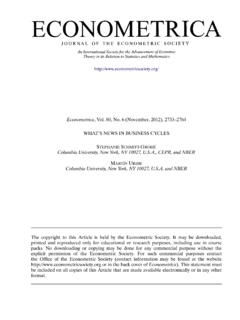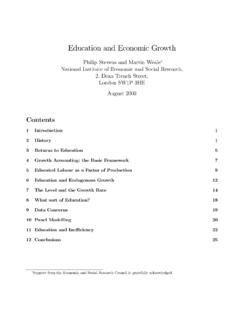Transcription of The political economy of universal health coverage
1 The political economy of universal health coverageDavid Stuckler 1,2, Andrea B Feigl3, Sanjay Basu4, Martin McKee2 Background paper for the global symposium on health systems research 16-19 november 2010 montreux, switzerland1. University of Oxford, UK. 2. London School of Hygiene and Tropical Medicine, Harvard School of Public health , USA. of California San Francisco, authors are grateful to Kent Ranson and Tim Evans for their support and constructive paper is one of several in a series commissioned by the World health Organization for the First Global Symposium on health Systems Research, held 16-19 November, 2010, in Montreux, Switzerland.
2 The goal of these papers is to initi-ate a dialogue on the critical issues in health systems research. The opinions expressed in these papers are those of the authors and do not necessarily reflect those of the symposium organizers. This paper has financial support from the Rockefeller Foundation; the Alliance for health Policy and Systems Research; and the German Federal Ministry for Eco-nomic Cooperation and Development (GTZ). All papers are available at the symposium website at symposium is organized by: World health Organization (WHO) Special Programme for Research and Training in Tropical Diseases (TDR) Alliance for health Policy and Systems Research Special Programme of Research, Development and Re-search Training in Human Reproduction (HRP) Global Forum for health ResearchThe following organizations are sponsors of this event.
3 China Medical Board (CMS) Doris Duke Charitable Foundation (DDCF) European Union (EU) Federal Office of Public health (FOPH), Federal Depart-ment of Home Affairs (DHA), Switzerland GAVI Alliance German Federal Ministry for Economic Cooperation and Development (GTZ) Global Fund to Fight AIDS, Tuberculosis and Malaria (GFATM) Global health Research Initiative (GHRI) The International Development Research Centre (IDRC), Canada Management Science for health (MSH) Ministry of Foreign Affairs, The Netherlands Norwegian Agency for Development Cooperation ( Norad) Public health Agency Canada (PHAC) Rockefeller Foundation Sight Savers Swedish International Development Cooperation Agency (SIDA) Swiss Agency for Development and Cooperation (SDC), Federal Department of Foreign Affairs (FDFA), Switzerland UK Department for International Development (DFID) United Nations Population Fund (UNFPA) United States Agency for International Development (USAID) Wellcome Trust1 TABLE OF CONTENTS KEY 2 EXECUTIVE 4 7 SECTION 1.
4 WHAT IS universal health coverage ?.. 10 SECTION 2. GLOBAL PREVALENCE OF universal health 15 SECTION 3. EXPLAINING CROSS-NATIONAL VARIATIONS IN universal health 18 Literature Review of Determinants of universal health coverage .. 18 Country Case 23 Cross-National Econometric Analysis .. 30 SECTION 4. MAKING IT HAPPEN A RESEARCH AGENDA TO SUPPORT 35 2 KEY MESSAGES 1. What do we mean when we talk about universal health Care? universal health Care is understood in a variety of ways. It involves judgements about who the potential recipients are, what is the range of services included within health care, and the quality of that care?
5 The literature on universal health Care comes from several disciplinary perspectives and addresses five main themes: accessibility to health care by its intended recipients, broad population coverage , a package of point-of-entry healthcare services, healthcare access based on rights and entitlements, and protection from the social and economic consequences of illness. The term universal health Care has most frequently been used in describing policies for care in high-income countries, while universal health coverage (UHC) has most often been applied to low- and middle-income countries; hence, the fact that population coverage may not guarantee a sufficient breadth of care services among the poorest countries (merely achieving basic coverage of the populace) is an important consideration that is often overlooked.
6 2. How do we define a universal health coverage System, and which countries have such a system? We have defined UHC as the existence of a legal mandate for universal access to health services and evidence that suggests the vast majority of the population has meaningful access to these services. Out of 192 countries studied, 75 had legislation mandating universal access to healthcare services independent of income. Of these, 58 met the criteria based on available measures of coverage (including >90% of the population having access to skilled birth attendance and insurance coverage ) which serve as broader proxies for access to care.
7 3. Why do some countries have universal health coverage while others do not? Adopting UHC is primarily a political , rather than a technical issue. In states that are able to function effectively (next point) the strength of social democratic parties and labour movements is one main determinant of whether a country uses its available economic resources to achieve UHC and how soon it does so. 4. What are, if any, the social, economic, and political preconditions to establish universal health coverage as a realistic political goal? The widely held view that low GDP is the main barrier to achieving UHC is likely to be a consequence of poor countries having one or more of the following characteristics: lack of effective control over their entire territory; weak tax-collection capacity; and insufficient human and physical resources to deliver effective health care.
8 Thus, poverty per se is likely to be an obstacle to UHC mainly to the extent that it is associated with the lack of a functioning state and health system. However, being poor is not an excuse to reject UHC, and low-income regions in the past have successfully implemented universal systems. Empirical analysis indicates that political commitment (expressed as a legal mandate), higher tax revenues, and greater democracy are associated with a greater share of GDP going to public health spending. Conversely there is evidence that higher private expenditure may crowd out public spending and that UHC is more difficult to achieve in divided societies on ethnic, 3 religious, linguistic and/or with high income inequalities.
9 Expansion of health care coverage typically occurs as part of a broader process of increasing social welfare programmes. 5. How have countries in the past achieved universal health coverage , and which lessons apply to low- and middle-income countries today? Most countries have adopted legal commitments to achieve universal health coverage at low- and middle-income stages of development. When they have not, healthcare has tended to expand gradually, leaving many members of the population vulnerable for extended periods of time. However, a legal commitment is insufficient on its own and must be translated into policies that establish a comprehensive, largely publicly financed system.
10 An over-reliance on partial and private sector-focused care appears to disproportionately benefit richer groups, reducing both efficacy and access to coverage . It also creates groups with strong vested interests in the status quo that can block further progress. Public financing is more equitable and pro-poor, and reflects the shared value of providing care based on need rather than ability to EXECUTIVE SUMMARY universal health Care is one of the most widely shared goals in global health . The concept of universal health Care captures a common set of common values: equity, shared responsibility, and quality healthcare delivery irrespective of ability to pay.

